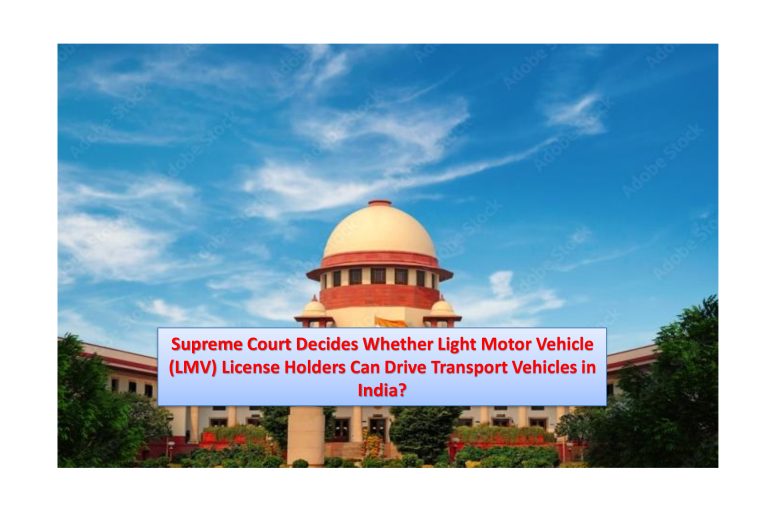Supreme Court Decides Whether Light Motor Vehicle (LMV) License Holders Can Drive Transport Vehicles in India
The case M/s Bajaj Allianz General Insurance Co. Ltd. v. Rambha Devi & Ors. Civil Appeal No. 841 of 2018 A Constitution Bench of Five Judges, has raised significant legal questions about whether a person holding a Light Motor Vehicle (LMV) driving license can drive a transport vehicle that weighs less than 7,500 kg. The dispute centers around licensing regulations and insurance liability, highlighting the complexities of Indian transport laws.
The Legal Journey: From Confusion to Clarity
The ruling in M/s Bajaj Allianz General Insurance Co. Ltd. v. Rambha Devi & Ors. followed the earlier decision in Mukund Dewangan v. Oriental Insurance Co. Ltd. (2016) 4 SCC 298, where the Court concluded that LMV license holders could drive light transport vehicles without additional endorsements, provided the vehicle’s weight did not exceed 7,500 kg. This expanded the scope of LMV licensing, especially for those dependent on light transport work. However, the Bajaj Allianz case drew attention to the risks and concerns around road safety and insurance liabilities.
Arguments Against the 2017 Judgment
Representatives from insurance companies and road safety advocates presented several concerns, particularly in M/s Bajaj Allianz Case (Supra)., which mirrored many arguments made in the Mukund Dewangan case:
- Clear Distinction in the MV Act: The MV Act categorizes LMVs and transport vehicles separately, with distinct licensing criteria. Critics argued that the 1994 amendment consolidated different vehicle types under the “transport vehicle” category, which should require separate endorsements for driving transport vehicles.
- Stricter Requirements for Transport Vehicles: Transport vehicle licenses require higher age limits, medical checks, and specialized training—requirements designed to ensure the safe operation of vehicles that carry passengers or goods.
- Insurance and Liability: In Bajaj Allianz and similar cases, insurers argued that allowing LMV license holders to operate transport vehicles without additional training or endorsements could expose them to increased liability risks. Insurance policies are structured around specific licensing conditions, and the broader interpretation of LMV licensing could complicate claims and liabilities.
Key Issues Presented Before the Supreme Court
As the Bajaj Allianz case evolved, it raised several legal questions:
- Legislative Intent Behind Licensing Classifications: Does the MV Act permit LMV license holders to drive transport vehicles weighing under 7,500 kg, or should specific licensing requirements for transport vehicles override the LMV definition?
- Impact of the 1994 Amendments: The 1994 amendment consolidated transport vehicle categories. Does this imply that additional endorsements are required for all light transport vehicles under 7,500 kg?
- Constitutional and Livelihood Considerations: Would requiring additional endorsements for light transport vehicles infringe upon the livelihood rights of LMV drivers under Article 19(1)(g) of the Indian Constitution?
The Supreme Court’s Final Judgment
In its final judgment, the Supreme Court upheld the earlier ruling from Mukund Dewangan Case (Supra), stating that LMV license holders could operate light transport vehicles without requiring additional endorsements, as long as the vehicle’s gross weight did not exceed 7,500 kg. The Court interpreted the LMV definition to include transport vehicles within this weight range, finding no legislative intent in the 1994 amendments to mandate separate endorsements for such vehicles.
While Bajaj Allianz and other stakeholders raised concerns about road safety and insurance implications, the Court acknowledged the lack of definitive evidence linking LMV license holders driving light transport vehicles with increased accident rates. However, the Court suggested that Parliament may wish to clarify these distinctions within the MV Act, creating clearer categories such as “LMV Class 1” and “LMV Class 2.”
Implications for Road Safety, Insurance, and Driver Rights
The Bajaj Allianz case has significant implications for road safety, insurance policies, and the rights of LMV license holders:
- Regulatory Clarity: By affirming that LMV license holders can drive light transport vehicles, the Court has provided clearer guidelines for drivers and employers, avoiding confusion regarding licensing requirements.
- Balancing Livelihood and Safety: While the ruling acknowledges the livelihood concerns of LMV drivers, it emphasizes the need for future legislative reforms to address any gaps in training and ensure safety on the roads.
- Insurance and Liability: Insurance companies may need to revise their policies to reflect the broader interpretation of LMV licenses. This could involve new considerations for liability, risk assessment, and policy coverage for drivers operating light transport vehicles.
Conclusion: A Call for Legislative Clarity
The judgment in this present case underlines the complexities surrounding vehicle classifications, licensing regulations, and public safety. While the decision protects the practical interests of LMV drivers, it also highlights the necessity for legislative precision in regulating road transport. As the transportation landscape in India continues to evolve, lawmakers may need to revisit the Motor Vehicles Act to ensure that it adequately addresses modern challenges, balancing safety, driver qualifications, and the public interest.
Sakshi Raghuvanshi
Senior Associate
The Indian Lawyer & Allied Services





































Leave a Reply